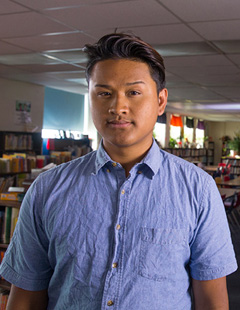
My United Way encouraged me to dream big. My neighborhood is rough, and my mom isn’t home much because she works two jobs to pay the bills. The after-school program is a place where I can relax and feel safe. Everyone there genuinely cares about me, supports me and encourages me to explore my talents. Now I have big plans for my future.
Seventeen-year-old Pring speaks confidently when he describes art as life and life as art. Being creative is a big part of who he is as a teenager growing up in the Hilltop. And when he talks about the possibilities for his life beyond high school and his neighborhood, it’s clear he has the determination and vision to attend college and pursue a career using his artistic talents.
But the odds have been stacked against Pring in many ways. His father moved out years ago when the family started having financial problems, he says. As a result, his mother, who was born in Cambodia, has always worked two jobs to make ends meet for the family. Pring, the oldest of his two siblings, could see how difficult things were for her. “Most parents around here aren’t home much because they have to work so hard,” he says. “It’s sad for the kids.”
At age 11, he went a couple times to the Healthy Asian Youth (HAY) after-school program within the Asian American Community Services organization. The program provides tutoring, mentoring, leadership training, and other educational services to youth, as well as recreational activities such as break dancing, sports, arts and crafts, and field trips. “I left because I thought I was too cool for it,” he explains, shaking his head. “Then I just got stuck.”
As an Asian male in a low-income neighborhood, he struggled in middle school to fit in with other kids. He was bullied, he says, and treated unfairly by teachers. He was suspended from school. At one point, he stopped eating lunch to avoid the other kids, stopped being social at all and didn’t even bother with his art.
Pring describes his Hilltop neighborhood as a broken community where people give up instead of fixing things. Many of the kids, he says, feel like they’ve been given up on, too. There’s a lot of violence, gang activity, and his friends get robbed sometimes. When he finally gave the HAY program another chance, he found a home away from the trouble on the streets.
“I get to dance, work on my art and hang out with friends,” he says, smiling broadly. “A lot of people in school want to talk down to you because you don’t have the right clothes or car. But it’s not like that at HAY. We bring each other up not down, and support each other.”
And Pring found plenty of support when he needed it. His mentor, Tiffany, and the program’s director, Danny, gave him rides, took him out to eat, and encouraged him to keep his grades up when he was working two jobs to help his mom pay the bills. He credits Tiffany for reminding him that he’s a good kid, and for teaching him how to be noble and honorable. They also recognized his leadership abilities and his artistic talents, encouraging him to develop both.
“At HAY, they see what I can be—things I didn’t see in myself. And they keep seeing more things in me—stuff I would never have found in me by myself!” Pring explains. “I definitely feel ready for the world and my future, and that’s from having people who support me and love me.”

